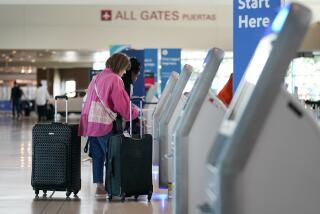Protecting Consumers?
- Share via
Some people in Congress are making noises--again--about the need to shore up protection mechanisms for consumers in matters of travel and transportation.
Two segments of the industry seem to have become the focus for this latest flurry of official breast-beating: the airlines, as always, and the nation’s tour packagers. The idea seems to be that new rules are needed for both, if the traveling public’s money and vacation plans are to be safeguarded.
Unfortunately, it seems that the proposals being bandied about are at best naive, and at worst, downright unfair.
Take the case of tour wholesalers, for example. Some members of the House subcommittee on transportation, tourism and hazardous materials have indicated they will introduce legislation to let the federal government regulate these operators.
The subcommittee apparently believes that the public’s exposure to travel scams and con men would be greatly minimized if the federal government got involved.
Bucking the Trend
What’s ironic is that in the past decade the government has been lessening its involvement in regulating trade and industry, not increasing it.
“The ones they should be after are the bandits who strand kids or run tours without paying taxes,” says Bill Rother, senior vice president of Tauck Tours in Westport, Conn.
Nobody is pretending that honest tour operators can’t fail. But few segments of the travel community have taken their responsibilities to the consumer as seriously as most tour operators have.
Perhaps the most significant and visible indication of their concern is the trade organization known as the United States Tour Operators Assn., founded in Los Angeles more than a decade ago by a handful of local firms. USTOA has grown to 46 companies nationwide.
Financial Reserves
Membership requires each to maintain $1 million in liability insurance and a $100,000 bond. Each pays an annual fee and is thoroughly checked before being accepted into the organization.
Does that mean that a USTOA member company could never go under? Of course not.
What it does mean is that anybody displaying the USTOA logo is a professional, has been around for a few years and is in the business of selling travel, not some kind of glorified scheme or scam.
And it means that there will at least be some money around to provide a degree of refund protection in the event that a member does fail.
It should not be assumed that any packager who is not a member of USTOA must be avoided. Some, for reasons of their own, choose to remain outside the organization.
Voluntary Bonds
Many companies, both in and out of USTOA, also maintain their own voluntary financial bonds, some worth as much as $5 million, which is another sign of the industry’s awareness of its responsibilities.
Then there’s the American Society of Travel Agents’ tour payments protection plan, to which several dozen wholesalers belong. That fund protects consumers buying their tours through ASTA retail members. Some operators belong to both the ASTA plan and USTOA.
“Every time the government gets involved, things get very complicated and it ends up costing the public money,” says Gerry Healey, senior vice president of Pleasant Hawaiian Holidays in Westlake Village. “Regulation is not the answer. If a guy’s a crook, he’s going to stay a crook, regardless of regulation. What we need is an educational program for travel agents and consumers to teach them what products they can trust.”
Another example of misdirected Congressional thinking, it seems, is the House subcommittee on aviation’s approval of a Department of Transportation plan to give the airlines one year of antitrust immunity in order to design a default protection program. If, at the end of that time, they have failed to do so, the DOT would force them to carry a failed competitor’s passengers--free of charge.
There is something unfair about a plan that would force healthy airlines to provide transportation for customers of a company that failed.
Providing financial protection for airline passengers is vital in this age of fare wars, cutthroat competition, declining yields and red-inked bottom lines.
Some people would like to see a portion of the so-called Aviation Trust Fund, now standing at well over $5 billion, set aside for bankruptcy protection for passengers. So far that has been rejected.
The airlines have a year to create a joint plan acceptable to the DOT and Congress. One would think that, faced with the alternative--to provide transportation for stranded passengers, apparently without remuneration--they would be able to do so without much difficulty.
More to Read
Inside the business of entertainment
The Wide Shot brings you news, analysis and insights on everything from streaming wars to production — and what it all means for the future.
You may occasionally receive promotional content from the Los Angeles Times.










